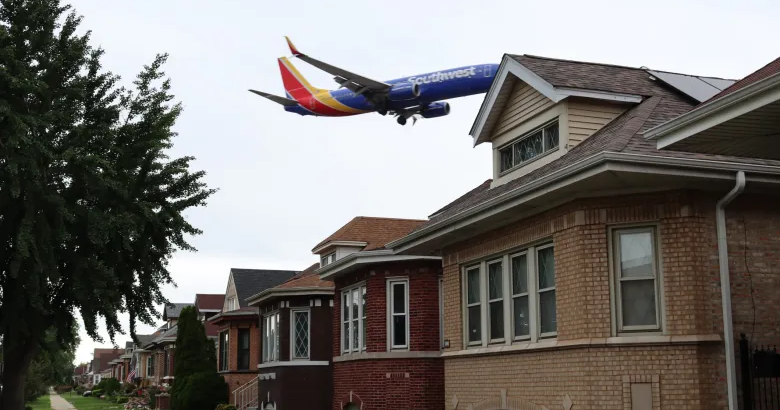Link to full article at SRP Local News
The Chicago City Council Zoning Committee last week approved amendments to a 2020 ordinance that will allow citywide construction of additional dwelling units (so-called granny flats) in single-family home basements or attics.
The 13-7 vote on July 15, which still must receive full council approval, would expand construction from only certain areas of the city.
The next day, Ald. Marty Quinn (13th) and other ordinance opponents successfully stalled an immediate full council vote on the amendments.
“What ADUs would do is compromise the integrity of single-family dwellings in neighborhoods by turning raised ranches or bungalows into apartment buildings overnight with no aldermanic oversight or no community input,” he said.
Quinn said it was appropriate to address additional concerns not considered by the committee on July 15.
A full council vote on the matter is scheduled for Sept. 25.
Quinn argued Southwest Side wards are 95 percent single-family homes prompting people to move into the area to raise families and attend its excellent schools; he noted five schools were built or upgraded in the past 15 years to give the community better educational opportunities.
According to a February 2023 Chicago Tribune article, Quinn began working to close the educational equity gap between north and south side schools in 2011, addressing a rise in Southwest Side student enrollment and to eliminate continued overall disinvestment in the south and west sides.
“This is an all-out attack on the bungalow belt by Mayor Brandon Johnson who is looking to check a political box at the expense of hardworking firefighters, teachers and police officers who live in these communities,” he said.
West Lawn resident Diane Ramirez and her husband, who are single-family homeowners in the 13th Ward, said she might consider an ADU for their home.
“Eventually, we might become empty-nesters and it would be nice to be able to rent out [an ADU] if need be, just to have that extra income,” she said. “Also, retirement might be soon and we might not have our Social Security income, so it would also be nice to have an opportunity to have that extra income.”
Francis La Cascio, a UIC student, spoke in favor of ADUs along with improved public transportation during the Zoning Committee’s open forum for public comments on July 15.
“As a student, I don’t make a lot of money; I spend most of my time studying,” he said. “Right now, our rent prices are rising at an astronomical rate. It’s [ADUs] already been tried and true in a lot of other cities, [like] Minneapolis and Portland, Oregon, to lower the price of rent from inflated values. We need housing options for everyone.”
Quinn said he had the votes to kill the ordinance during Wednesday’s city council meeting, prompting the mayor to introduce last minute amendments to delay an immediate full council vote.
One of the changes proposed by Ald. Bennett Lawson (44th), the ordinance’s sponsor, was an “administrative adjustment” amendment meaning aldermen would be notified of any filed ADU application.
Quinn countered with a disallowance of ADUs in single-family homes zoned R1 or R2. Homes in R3 zones could opt in depending on the need for additional living space for multi-generational families.
Rules for landlords and renters include controls over rent prices, how many units can be built, and the use of certified contractors or architects.
According to the city’s ADU website, only two ADU permits will be issued per block, per year and buildings with one to three units must be owner-occupied to add an ADU in the South and West zones.
According to the 2020 ordinance, rent for properties with two or more units must be “… legally restricted as affordable at 60% Area Median Income for 30 years after its construction. Properties with two or three units must provide one affordable unit, four to five units, two affordable units, and so on.”
To be eligible to rent an ADU, one renter’s income eligibility limit would be $38,220 and range up to no more than $80,820 for 10 people.
Safety issues were not addressed during the Zoning Committee meeting on July 15, according to Quinn.
“The Fire Chief, Nan Holt, was not present to weigh in on what these things could mean,” he said. “If you convert an attic or basement into an apartment, what is the danger of doing that?
Five or six years ago, in an illegal attic apartment in the 6000 block of South Kenneth, tragically, a 4-year-old child lost her life.”
On property taxes, an application for an ADU would cause a reclassification of the owner’s home for tax purposes, Quinn said.
“This is another knock on the mayor’s initiative that he’s creating more affordable housing,” he said. “If taxes are going up, that is just going to be passed along to the renter.”
Outside investors from New York using property management from Texas have also become an issue for Quinn.
“I have concerns about investors that are eager to buy up homes on the Southwest Side,” Quinn said. “We’re dealing with investors from New York right now. They don’t give a darn about their neighbors, how their property looks and have a building property manager out of Texas we tracked down who is very difficult to work with.”
Quinn believes there are too many unaddressed issues that need to be resolved to allow ADUs in the Southwest Side bungalow belt.
“For all of those reasons, I’m a ‘no’,” he said. “I will continue to fight this tooth and nail and what we saw on July 16 was the mayor didn’t have the votes and had to make adjustments. I’ll continue to sound the alarm that this is bad for Chicago and bad for our community of families.”

